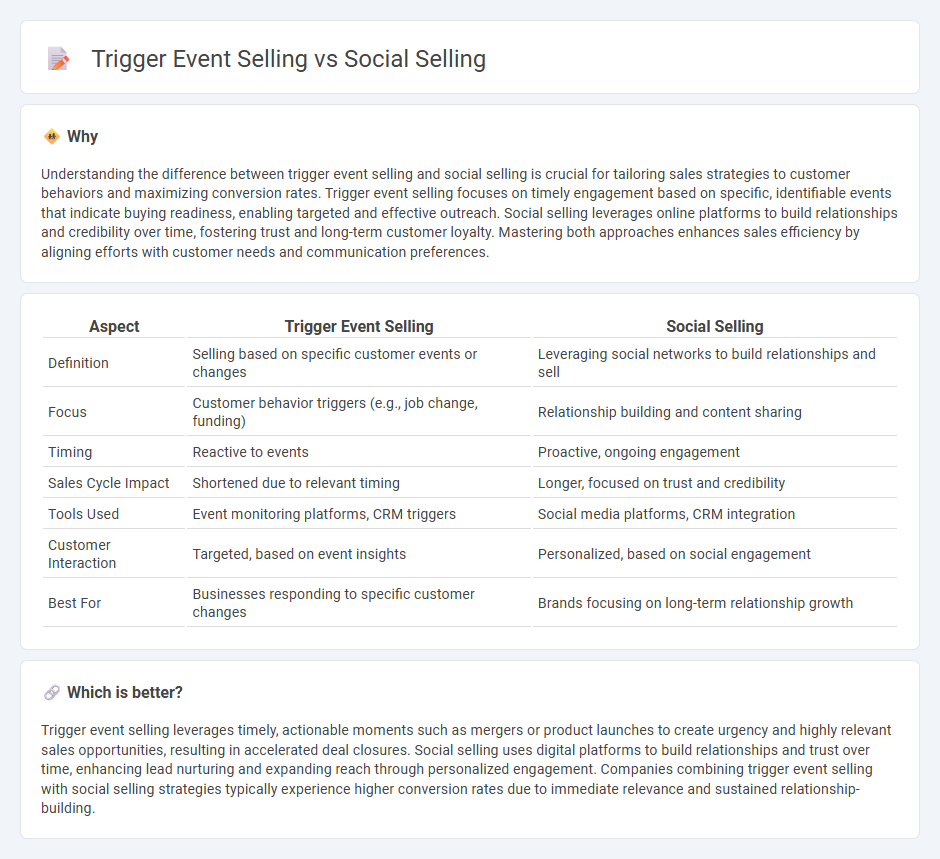
Trigger event selling leverages specific customer actions or external circumstances to initiate timely and relevant sales outreach, increasing the chances of conversion. Social selling focuses on building trust and relationships through social media platforms by engaging prospects with valuable content and personalized interactions. Explore how integrating these strategies can enhance your sales performance and drive better results.
Why it is important
Understanding the difference between trigger event selling and social selling is crucial for tailoring sales strategies to customer behaviors and maximizing conversion rates. Trigger event selling focuses on timely engagement based on specific, identifiable events that indicate buying readiness, enabling targeted and effective outreach. Social selling leverages online platforms to build relationships and credibility over time, fostering trust and long-term customer loyalty. Mastering both approaches enhances sales efficiency by aligning efforts with customer needs and communication preferences.
Comparison Table
| Aspect | Trigger Event Selling | Social Selling |
|---|---|---|
| Definition | Selling based on specific customer events or changes | Leveraging social networks to build relationships and sell |
| Focus | Customer behavior triggers (e.g., job change, funding) | Relationship building and content sharing |
| Timing | Reactive to events | Proactive, ongoing engagement |
| Sales Cycle Impact | Shortened due to relevant timing | Longer, focused on trust and credibility |
| Tools Used | Event monitoring platforms, CRM triggers | Social media platforms, CRM integration |
| Customer Interaction | Targeted, based on event insights | Personalized, based on social engagement |
| Best For | Businesses responding to specific customer changes | Brands focusing on long-term relationship growth |
Which is better?
Trigger event selling leverages timely, actionable moments such as mergers or product launches to create urgency and highly relevant sales opportunities, resulting in accelerated deal closures. Social selling uses digital platforms to build relationships and trust over time, enhancing lead nurturing and expanding reach through personalized engagement. Companies combining trigger event selling with social selling strategies typically experience higher conversion rates due to immediate relevance and sustained relationship-building.
Connection
Trigger event selling capitalizes on specific, time-sensitive occurrences within a prospect's environment to initiate relevant outreach, while social selling leverages social media platforms to build relationships and monitor these events. By integrating social listening tools, sales professionals can identify trigger events such as company expansions, executive changes, or product launches in real-time through social networks. This synergy enables timely, personalized engagement that increases the likelihood of successful conversions in sales processes.
Key Terms
**Social Selling:**
Social selling leverages social media platforms like LinkedIn and Twitter to build relationships, engage prospects, and share valuable content that nurtures leads over time. It emphasizes trust and credibility, using personalized interactions and insights to guide buyers through the sales funnel without aggressive pitches. Explore more about how social selling can transform your sales strategy and foster long-term customer loyalty.
Personal Branding
Social selling leverages personal branding to build trust and establish authority by consistently sharing valuable content and engaging authentically with prospects on social media platforms like LinkedIn. Trigger event selling capitalizes on specific events such as job changes or company announcements to initiate timely, personalized outreach that resonates with potential clients. Explore effective strategies to enhance your personal brand and harness trigger events for impactful sales conversations.
Relationship Building
Social selling prioritizes building genuine relationships through personalized interactions and consistent engagement across social media platforms, fostering trust and long-term customer loyalty. Trigger event selling targets specific moments such as company changes, product launches, or market shifts to initiate timely, relevant outreach that addresses immediate needs. Explore how integrating these approaches can amplify your sales strategy and deepen client connections.
Source and External Links
Social selling - Wikipedia - Social selling is the process of developing relationships as part of the sales process, often via social networks like LinkedIn, Twitter, or Facebook, focusing on building personal connections and sharing relevant content to support sales primarily in B2B or considered consumer purchases.
What Is Social Selling? (With Benefits and Best Practices) - Indeed - Social selling uses professional social media profiles to secure leads and build relationships by sharing strategic content and engaging with potential buyers, helping businesses achieve sales goals more effectively.
Social selling: What it is and how to get good at it - Hootsuite Blog - Social selling means using social networks to connect, understand, and nurture leads and prospects through meaningful interactions, helping sales professionals build their networks and provide personalized solutions that lead to higher sales success.
 dowidth.com
dowidth.com